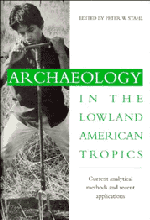Book contents
- Frontmatter
- Contents
- List of figures
- List of tables
- List of contributors
- Introduction
- 1 Archaeological survey and site discovery in the forested neotropics
- 2 The archaeology of community organization in the tropical lowlands: a case study from Puerto Rico
- 3 Archaeological methods for the study of ancient landscapes of the Llanos de Mojos in the Bolivian Amazon
- 4 Searching for environmental stress: climatic and anthropogenic influences on the landscape of Colombia
- 5 “Doing” paleoethnobotany in the tropical lowlands: adaptation and innovation in methodology
- 6 Plant microfossils and their application in the New World tropics
- 7 Differential preservation histories affecting the mammalian zooarchaeological record from the forested neotropical lowlands
- 8 Biological research with archaeologically recovered human remains from Ecuador: methodological issues
- 9 Interpreting dietary maize from bone stable isotopes in the American tropics: the state of the art
- 10 From potsherds to pots: a first step in constructing cultural context from tropical forest archaeology
- 11 Returning to Pueblo Viejo: history and archaeology of the Chachi (Ecuador)
- References
- Index
2 - The archaeology of community organization in the tropical lowlands: a case study from Puerto Rico
Published online by Cambridge University Press: 23 November 2009
- Frontmatter
- Contents
- List of figures
- List of tables
- List of contributors
- Introduction
- 1 Archaeological survey and site discovery in the forested neotropics
- 2 The archaeology of community organization in the tropical lowlands: a case study from Puerto Rico
- 3 Archaeological methods for the study of ancient landscapes of the Llanos de Mojos in the Bolivian Amazon
- 4 Searching for environmental stress: climatic and anthropogenic influences on the landscape of Colombia
- 5 “Doing” paleoethnobotany in the tropical lowlands: adaptation and innovation in methodology
- 6 Plant microfossils and their application in the New World tropics
- 7 Differential preservation histories affecting the mammalian zooarchaeological record from the forested neotropical lowlands
- 8 Biological research with archaeologically recovered human remains from Ecuador: methodological issues
- 9 Interpreting dietary maize from bone stable isotopes in the American tropics: the state of the art
- 10 From potsherds to pots: a first step in constructing cultural context from tropical forest archaeology
- 11 Returning to Pueblo Viejo: history and archaeology of the Chachi (Ecuador)
- References
- Index
Summary
The systematic analysis of prehistoric community organization has been slow to develop in the lowlands of South America and the West Indies. This is a product of two factors: (1) a predominant concern among archaeologists with the origins, spread, and complexity of the populations that inhabited the region; and (2) the logistical constraints on doing archaeology in the tropics. In recent years, archaeologists working in the lowlands have expanded their range of investigations to include ancient communities as legitimate foci of concern. In doing so, serious methodological challenges must be confronted in delineating site sizes, settlement layouts, and occupational histories. It is not acceptable to blindly import methods or techniques developed for other world-areas; we must experiment with and design approaches that are uniquely appropriate for getting at community organization in the tropical lowlands. In this paper, I review the problems, constraints, and challenges of studying community organization in the neotropics. A case study is offered using the Maisabel site, a large Saladoid/Ostionoid village on the north coast of Puerto Rico.
Problems and constraints
The major factor hindering community-oriented archaeology in the tropics can probably be narrowed down to one word: visibility. Tree growth and ground cover vegetation mitigate the effectiveness of surface surveys in the tropics (see Zeidler, this volume).
- Type
- Chapter
- Information
- Archaeology in the Lowland American TropicsCurrent Analytical Methods and Applications, pp. 42 - 65Publisher: Cambridge University PressPrint publication year: 1995
- 2
- Cited by



